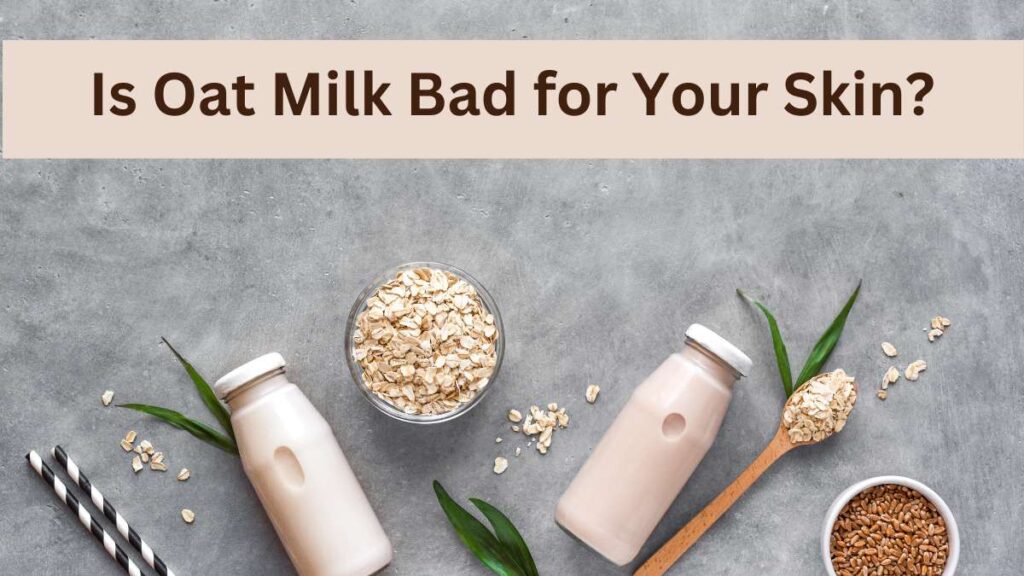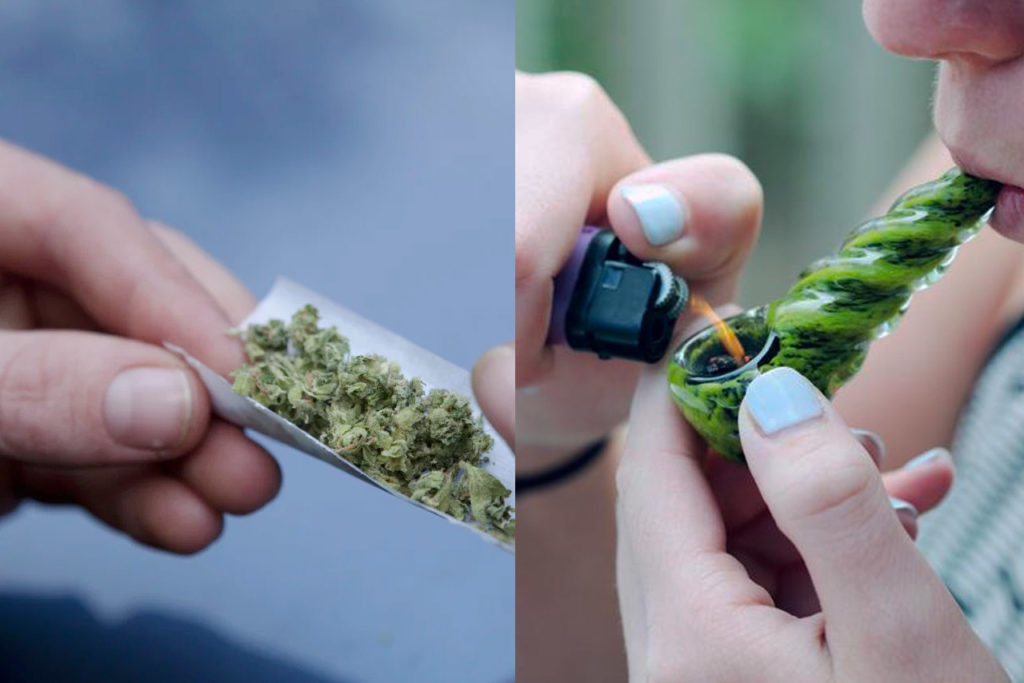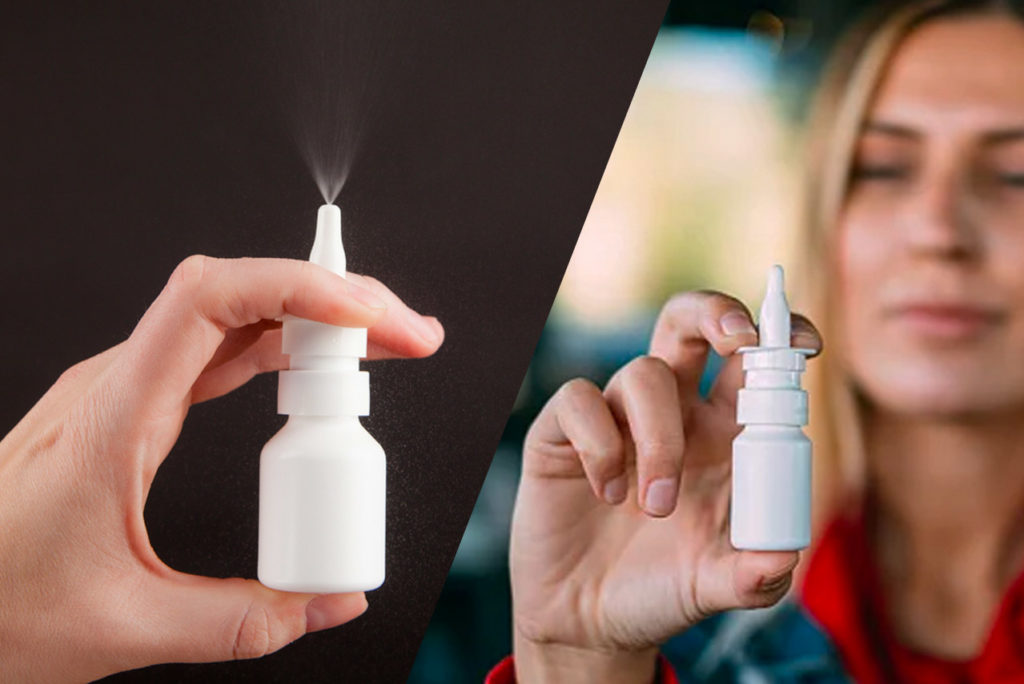Wondering if oat milk is good for your skin? You’re not alone. As oat milk becomes more popular, many people are asking this question. In this article, we discuss “Is Oat Milk Bad for Your Skin?”
We’ll look at Can oat milk cause skin problems? and Is oat milk good for your skin?. Does oat milk cause acne? Whether you love oat milk or are just thinking about trying it, you’ll find clear answers here.
Contents
What is Oat Milk?
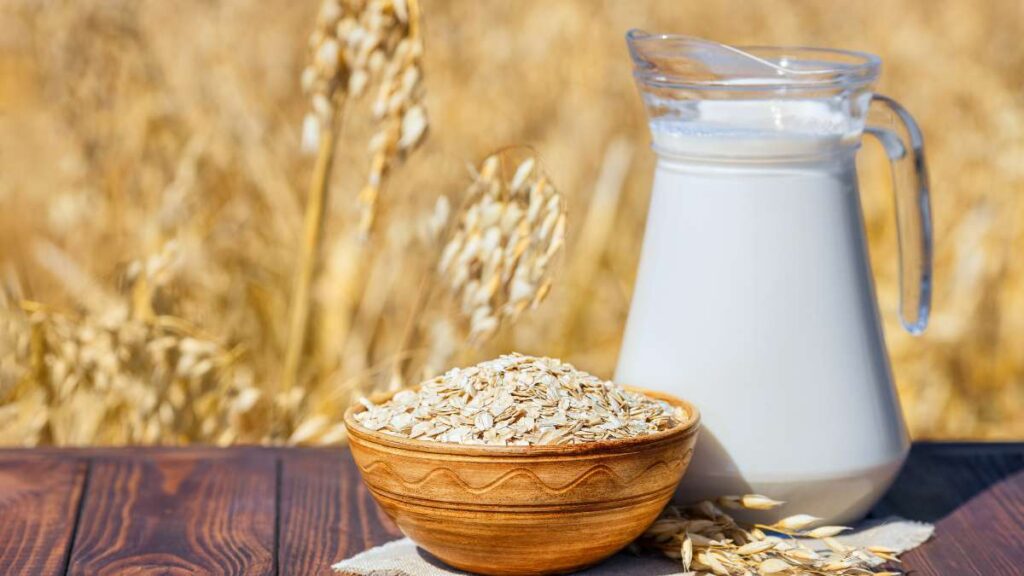

Oat milk is a drink made from oats. People blend oats with water to create a milk-like liquid. It’s popular among those who don’t drink regular milk, like people who are lactose intolerant or prefer plant-based options. Oat milk is creamy and has a bit of a sweet taste, making it a favorite in coffee and cereal.
Oat Milk Ingredients
Oat milk is mainly made of oats and water. Here are some other ingredients you might find in it:
- Extra Nutrients: Brands often add vitamins and minerals to make oat milk as nutritious as cow’s milk.
- Sweeteners: Some add sugar or natural sweeteners for better taste.
- Oils: Oils like canola or sunflower make oat milk creamier.
- Thickeners: To keep it smooth and last longer, thickeners like gellan gum are added.
Each oat milk brand might be different, so it’s good to read the label if you have diet needs or skin concerns.
Can Oat Milk Cause Skin Problems?
While oat milk is generally considered a safe and healthy dairy alternative, it can cause skin problems in some individuals. Those with oat allergies or sensitivities might experience skin reactions like rashes or itching.
Additionally, oat milk’s carbohydrate content can impact blood sugar levels, potentially exacerbating skin conditions such as acne, especially in sweetened varieties. Also, certain additives and preservatives in commercial oat milk could irritate sensitive skin.
It’s important to pay attention to how your skin responds to oat milk and choose varieties with fewer additives and lower sugar content if you have concerns.
Is Oat Milk Good for Your Skin?
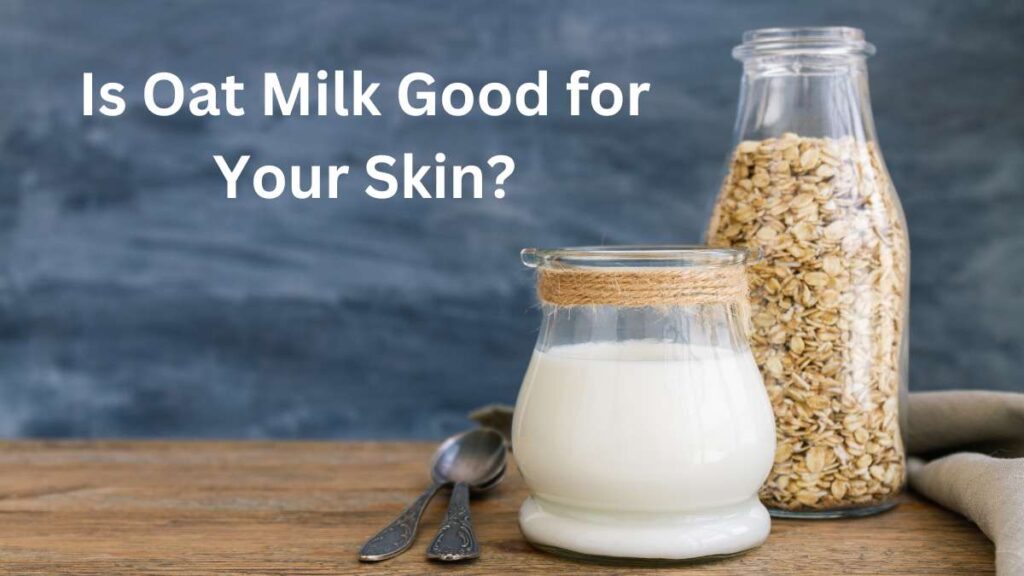

Oat milk isn’t just popular for its taste; it might also have benefits for your skin. Oats, the main ingredient in oat milk, are known for their skin-friendly properties. They contain compounds that can help soothe and nourish the skin. For instance, oats are rich in antioxidants and anti-inflammatory substances, which can be beneficial in managing skin conditions like eczema and acne.
Additionally, the vitamins and minerals added to many oat milk brands can also support skin health. Vitamins like B12 and minerals such as calcium and iron in fortified oat milk can contribute to maintaining healthy skin.
Similarly, we’ve explored the health aspects of other products, like Brookside Dark Chocolate, to help you make informed dietary decisions.
Are there any Negatives to Oat Milk?
While oat milk can be a beneficial addition to many diets, there are a few potential downsides to consider, especially regarding skin health.
High Sugar Content
Sweetened oat milk can have a lot of added sugar, which might not be great for your skin. High sugar intake has been linked to skin issues like acne and inflammation. If you’re concerned about your skin, choosing unsweetened oat milk is a safer bet.
Additives and Preservatives
Some oat milk brands use additives to improve texture and shelf life. These can include stabilizers, thickeners, and preservatives. For those with sensitive skin, these additives might cause irritation. Picking oat milk with fewer additives, or making your own at home, can help avoid this issue.
Nutritional Differences from Cow’s Milk
Oat milk doesn’t naturally have the same nutrients as cow’s milk. It’s often lower in protein and might not have enough vitamins and minerals unless it’s fortified. Not getting a balanced range of nutrients can indirectly affect your skin health. It’s important to have a varied diet to make sure you’re getting all the nutrients your skin needs.
Like with oat milk, being mindful of dietary restrictions and ingredients is crucial for maintaining good health. For instance, if you’re interested in gluten-free options, you might want to check out our analysis of Knorr Rice Sides.
Which Milk is Best for Your Skin?
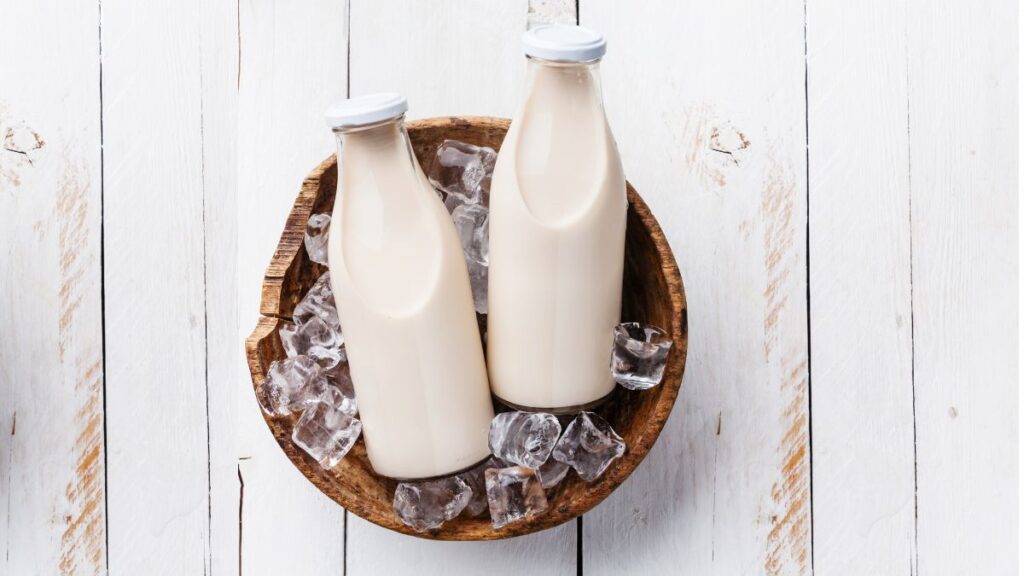

Choosing the right milk for your skin health can be a bit of a puzzle, with so many options available. Let’s compare some popular choices:
Cow’s Milk
Cow’s milk is rich in vitamins and minerals beneficial for skin health, like Vitamin A and Biotin. However, for some people, dairy can exacerbate acne and other skin conditions due to hormones present in milk.
Soy Milk
Soy milk is a good plant-based alternative, containing antioxidants that may benefit the skin. But, it’s important to note that soy also contains phytoestrogens, which can have mixed effects on the skin, especially in individuals sensitive to hormonal changes.
Almond Milk
Almond milk is low in calories and contains Vitamin E, an antioxidant known for its skin benefits. However, it’s typically lower in protein and other nutrients unless fortified.
Oat Milk
As discussed, oat milk can be skin-friendly due to its anti-inflammatory properties, but the added sugars and additives in some brands can be a downside for skin health.
Pros of Using Oat Milk for Skin
Oat milk can be a good choice for your skin, thanks to its natural properties. Here are some of the key benefits:
Gentle on Sensitive Skin
Oats are known for their soothing properties, making oat milk a gentle option for those with sensitive skin. Its anti-inflammatory effects can help calm irritation and redness.
Hydration and Nourishment
Oat milk can provide hydration to the skin. It contains compounds that support skin moisture, helping to keep it smooth and supple.
Antioxidants for Skin Health
Oats are a good source of antioxidants, which are important for protecting the skin from environmental stressors like pollution and UV rays. These antioxidants can help prevent premature aging and maintain a healthy skin barrier.
Cons of Using Oat Milk for Skin
While oat milk has its benefits, there are also some drawbacks to consider, especially for those with particular skin concerns:
Potential for Acne Flare-Ups
For individuals prone to acne, the sugar content in sweetened oat milk varieties might trigger breakouts. The high glycemic index of these sweetened options can lead to increased insulin levels, potentially worsening acne.
Allergic Reactions
If you’re allergic to oats, oat milk can cause adverse skin reactions like itching, redness, or hives. Even for those who aren’t allergic, additives in some oat milk brands might irritate sensitive skin.
Lack of Certain Nutrients
Oat milk naturally lacks some of the key nutrients found in dairy milk that are beneficial for skin health, like high-quality protein and certain vitamins. This means that relying solely on oat milk might leave gaps in your nutritional intake that could impact your skin health.
It’s important to weigh these cons against the pros when considering oat milk as part of your diet, especially if you have specific skin concerns or dietary restrictions.
Recommendations
If you’re considering including oat milk in your diet for skin health, here are some recommendations to maximize its benefits while minimizing potential drawbacks:
Choose Unsweetened Varieties
Opt for unsweetened oat milk to avoid the extra sugars that can lead to skin issues like acne. Reading labels is key to finding options with lower sugar content.
Check for Additives
Select oat milk brands with minimal additives, especially if you have sensitive skin. The fewer the ingredients, the less likely it is to cause irritation or allergic reactions.
Balance Your Diet
Remember that no single food or drink is a magic solution for skin health. A balanced diet rich in a variety of nutrients is crucial. Include foods high in omega-3 fatty acids, antioxidants, and vitamins to support overall skin health.
Monitor Your Skin’s Reaction
Everyone’s skin reacts differently. Pay attention to how your skin responds after introducing oat milk into your diet. If you notice any negative changes, consider consulting a dermatologist or nutritionist.
Homemade Oat Milk
Consider making your own oat milk at home. This way, you can control the ingredients and avoid any unnecessary additives or sweeteners.
FAQs
1. Can drinking oat milk improve my skin condition?
Oat milk can be beneficial for skin due to its anti-inflammatory properties, but its effect varies from person to person. It’s not a cure-all, but it can be a part of a skin-healthy diet.
2. Is oat milk a good option for acne-prone skin?
It depends. Unsweetened oat milk might be a better choice for acne-prone skin due to its lower sugar content. However, individual reactions vary, so monitoring your skin’s response is important.
3. Can I make oat milk at home to ensure it’s skin-friendly?
Yes, making oat milk at home allows you to control the ingredients, avoiding added sugars and preservatives that might affect your skin.
4. Are there any specific oat milk brands recommended for good skin health?
No specific brand is universally best for skin health. Look for unsweetened varieties with minimal additives and consider your personal skin sensitivities when choosing a brand.
5. Should I stop consuming dairy milk if I have skin issues?
This depends on your individual skin reaction to dairy. Some people find that reducing dairy intake helps their skin, while others don’t notice a difference. It’s always a good idea to consult with a healthcare professional for personalized advice.
Conclusion
Oat milk can affect different people’s skin in different ways. It has some good points, like helping with inflammation and keeping skin hydrated. But, it also has downsides like added sugar and other ingredients that might not be great for your skin.
The key is to see how your skin reacts to oat milk. Every person is different, so what works for one might not work for another. Remember, having a balanced diet and taking care of your skin in general is just as important. Oat milk can be a part of this, but it’s not the only thing that matters for healthy skin.

